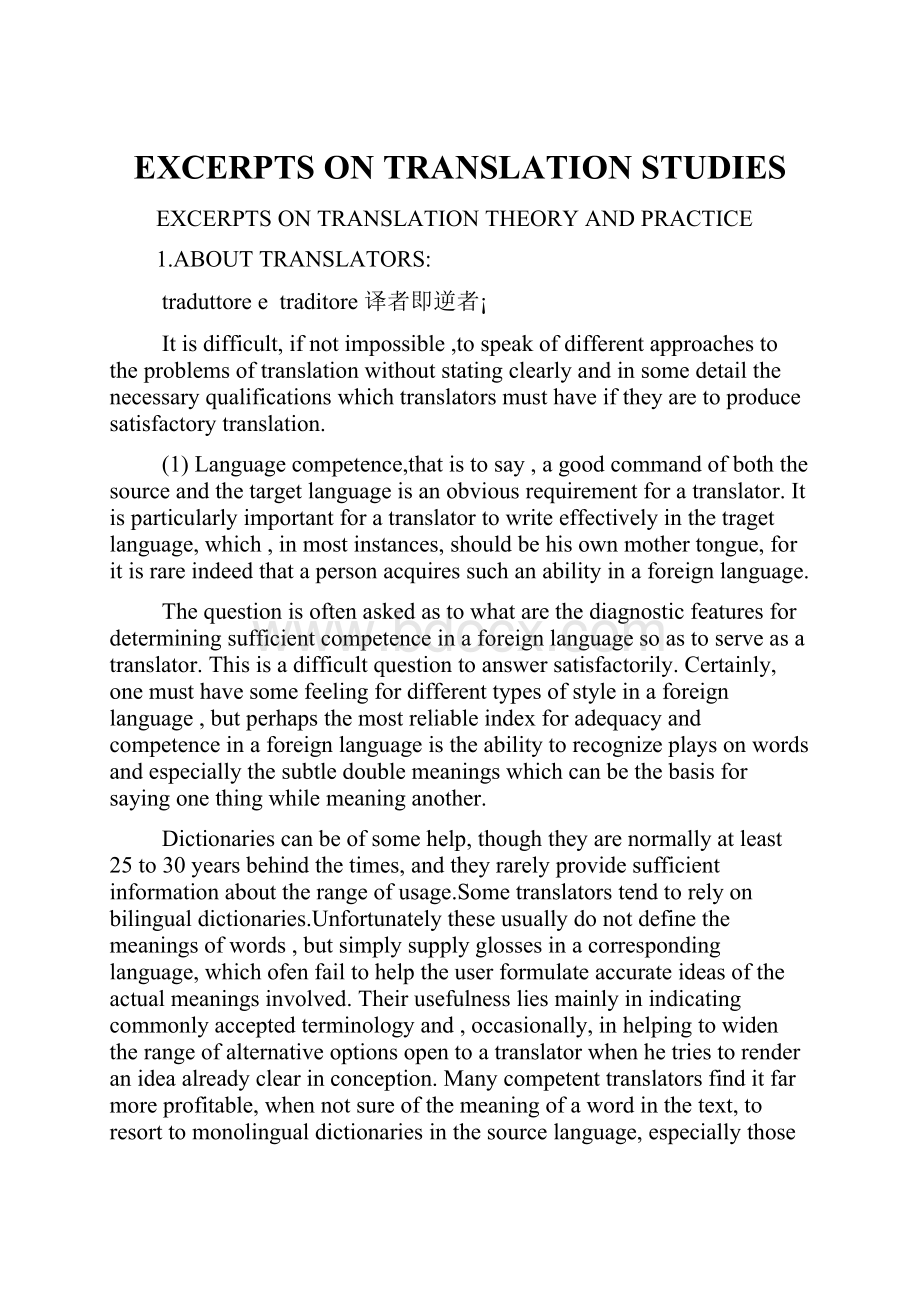EXCERPTS ON TRANSLATION STUDIES.docx
《EXCERPTS ON TRANSLATION STUDIES.docx》由会员分享,可在线阅读,更多相关《EXCERPTS ON TRANSLATION STUDIES.docx(106页珍藏版)》请在冰豆网上搜索。

EXCERPTSONTRANSLATIONSTUDIES
EXCERPTSONTRANSLATIONTHEORYANDPRACTICE
1.ABOUTTRANSLATORS:
traduttoreetraditore译者即逆者¡
Itisdifficult,ifnotimpossible,tospeakofdifferentapproachestotheproblemsoftranslationwithoutstatingclearlyandinsomedetailthenecessaryqualificationswhichtranslatorsmusthaveiftheyaretoproducesatisfactorytranslation.
(1)Languagecompetence,thatistosay,agoodcommandofboththesourceandthetargetlanguageisanobviousrequirementforatranslator.Itisparticularlyimportantforatranslatortowriteeffectivelyinthetragetlanguage,which,inmostinstances,shouldbehisownmothertongue,foritisrareindeedthatapersonacquiressuchanabilityinaforeignlanguage.
Thequestionisoftenaskedastowhatarethediagnosticfeaturesfordeterminingsufficientcompetenceinaforeignlanguagesoastoserveasatranslator.Thisisadifficultquestiontoanswersatisfactorily.Certainly,onemusthavesomefeelingfordifferenttypesofstyleinaforeignlanguage,butperhapsthemostreliableindexforadequacyandcompetenceinaforeignlanguageistheabilitytorecognizeplaysonwordsandespeciallythesubtledoublemeaningswhichcanbethebasisforsayingonethingwhilemeaninganother.
Dictionariescanbeofsomehelp,thoughtheyarenormallyatleast25to30yearsbehindthetimes,andtheyrarelyprovidesufficientinformationabouttherangeofusage.Sometranslatorstendtorelyonbilingualdictionaries.Unfortunatelytheseusuallydonotdefinethemeaningsofwords,butsimplysupplyglossesinacorrespondinglanguage,whichofenfailtohelptheuserformulateaccurateideasoftheactualmeaningsinvolved.Theirusefulnessliesmainlyinindicatingcommonlyacceptedterminologyand,occasionally,inhelpingtowidentherangeofalternativeoptionsopentoatranslatorwhenhetriestorenderanideaalreadyclearinconception.Manycompetenttranslatorsfinditfarmoreprofitable,whennotsureofthemeaningofawordinthetext,toresorttomonolingualdictionariesinthesourcelanguage,especiallythosewhicharecomprehensiveenough,withdetaileddefinitionsandsupportingquotations,toprovidepreciseunderstandingsoftheideasinquestion.
Languagecompetence,inthesenseofbeingabilingual,isnotenough,unlessitisalsomatchedbyaperson'sbeingbicultural.Thatistosay,onemusthaveanintimateknowledgeofthecultureinquestion.Onemustbeabletorecognizesubtleironiesandliteraryallusions.Dictionariesandencyclopediascanbeveryhelpfulindealingwithlexicalproblems,buttheyrarelygofarenoughinprovidingthekindofinformationwhichisnecessarytounderstandculturaldifferences.Unless,forexample,oneunderstandsthatinonelanguage-culturehumorisbaseduponunderstatement,whileinanotheritisusuallyamatterofoverstatement,atranslatorisverylikelytomissthepoint.
(2)Asufficientknowledgeoftherespectiveculturesandthesubjectmatterisindispensable.Theimportanceofsocio-culturalbackgroundinformation,whichcanhardlybeoveremphasized,hasbeentoucheduponaboveandwillbefurthertreatedinchaptereight.Butthequestionofsubjectmatterinformationisalsobecomingincreasinglyacuteinviewofthefactthatmoreandmoretranslatinginvolves"languageforspecialpurposes,"thatistosay,thetechnicaluseoflangguageinvolvinghighlyspecializedsubjects.Theexplosionofinformationwithinthelastcenturymeansthetherearenolongeranypolymaths,thatistosay,peoplewhohaveaneffectiveknowledgeofalldomainsoflearning.
Inthisconnection,oneparticularaspectisespeciallysignificant,namely,ahighrespectforone'signorance.Itisimportanttoknowwhenonereallyknows,butevenmoreimportanttoknowwhenonedoesnotknow.Inotherwords,recognizingthelimitationsofone'sknowledgeisaveryimportantingredientinsuccessintranslation.Unlessonerecognizesone'slimitations,andthereforeiswillingtoconsultreferencebooksandpersonswhomayknowmoreaboutthesubjectmatterinquestion,theresultsofatranslator'sworkarelikelytobefarbelowstandard.
Indealingwithaliterarytext,therangeofsubjectmattermaybeasdemandingoftranslatingscientifictexts.Inanovel,forexample,onemayatonepointbedealingwithvarioussortsofclouds.Withinafewparagraphs,thesubjectmayshifttodifferentkindsofhairdos,andwithinanotherpage,problemsofmentaldisorders,andlatertheintricaciesofmusicalscoresmaybetreated.
Tociteanexamplewhichmayseemtobetrivial,fromstoryaboutacocktailpartywhichtookplaceintheUnitedStates,oneChinesetranslatorrenderedthephrase"acocktailnapkin"as盖酒杯的餐巾.InChinese,therenderingmeansanapkinforcoveringaliquorglass.Nowcocktailnapkinsareoftenplacedunderglasses,heldbetweenthehandandtheglass,orputtootheruses,butnormallytheyareneverplacedontopoftheglasses.Evidentlythetranslator,notknowingwhatthethingis,hadresortedtoguesswork.Thismethodcertainlysavesagreatdealoftimeandisfar"easier"thanmakingthenecessaryinquiries,whichisoftenatime-consuming,laboriousprocess.Butitisjerry-building.Allserioustranslatorsavoidit,andanyonewhoiswillingtoundertakeserioustranslationmustalsoresistthetemptation.Intheend,afterall,itishonest,hardworkthatwillpay.Theconscientiouslaborthatoneputsininacquringinformationnecessaryforsatisfactorytranslationwillgraduallybuildupaformidablereservoirofknowledgethatwillmakepossibleaperformancebothreliableandefficient.
(3)Verbalimagination,thatistosay,acreativecapacitytodealwithvariouskindsofimageryisanoftenoverlookedprerequisite.Withoutacapacitytoproducenewandinterestingwaysofreferringtoobjectsandevents,atranslatorisalmostinevitablydestinedtobea"hacktranslator,"thatistosay,onewhoroutinelycranksouttranslationswhicharenotreallywrongbutwhich,atthesametime,arefarfrombeingontarget.
Oneofthebestwaystoevaluatethepotentialityforthiskindofverbalimaginationintranslationistoanalyzethewayinwhichapersonwritescreativelyinhisownmothertongue.Doeshewriteinafreshandvividway?
Doeshecomeupwithattractivesimilesandmetaphors?
Isheabletomakeastrikingpointbyasubtleshiftinthemeaningofaterm?
Ishesensitivetotheconnotationsofwords?
Arehisextendedfigurativeexpressionscongruent,ordoeshetastelesslymixhisfiguresofspeech?
Ifoneisnotadeptinexpressingideasinhisownmothertongue,heiscertainlynotlikelytodoaneffectivepieceofworkintranslating.
(4)Aproperunderstandingofthenatureofhistaskisasimportantasanyotherrequiste.Onemustbesensitivetocertainbasicprinciplesofinterlingualcommunication,andonthebasisoftheseprinciples,acquirethenecessaryskillthroughextensivepractice.Quiteclearly,atheoryoftransltionisnotenough.Onemustputitintopractice.Readingabookaboutswimming,skiing,orridingabicyclewillnotmakeonecompetentintheseactivitieswithoutpractice.Butpracticingasportwithoutaknowledgeofhowitshouldbeengagedincanresultinbadhabitswhichmaybedifficult,ifnotimpossible,toovercome.Accordingly,goingaboutthetaskoftranslatingwithafalseideaofwhatisreallyinvolvedmaynotonlyresultinpoortranslations,itmayseriouslyharmone'schancestocultivategoodhabits.
(5)Intellectualintegrityincombinationwithdevotiontothetaskisthemostimportantrequisiteofall.Onemustbewillingtoreflecthonestlytheintentoftheoriginalauthor.Anauthormustbepermittedtospeakforhimself.Toputwordsintohismouthortoalteranintent,basedonatranslator'sownvaluesorideas,issimplycheating.Ifatallpossiblethetranslatorshouldsharewiththeauthorabasicsympathyforthesubjectmatter.Undersuchcircumstancesidentificationwiththeintentoftheauthorismucheasier,butonemustalsobewillingtorenderthecontentofapassagewithwhichonedoesnotagree.
Allthesedesirablequalities,however,wouldbehardtoachieveifonedidnotpossessthemostfundamentalfactor:
devotiontoone'swork.Thisistheforcewhich,asitinvolvesthespirit,notjustthemind,willbeultimatelydecisiveinthemakingofagoodtranslator,ascanbefoundinsuchstrikingevidenceinthelifeofeverypastmasterofthisdifficultart.
JinDi&EugeneA.NidaOnTranslationpp.26-30
Atranslatorrequiresaknowledgeofliteraryandnon-literarytextualcriticism,sincehehastoassessthequalityofthetextbeforehedecideshowtointerpretandthentranslateit.Allkindsoffalsedistinctionshvebeenmadebetweenliteraryandtechnicaltranslation.BothSavory(1957)andReiss(1971)havewrittenthatthetechnicaltranslatorisconcernedwithcontent,theliterarytranslatorwithform.Otherwritershavestatedthatatechnicaltranslationmustbeliteral,aliterarytranslationmustbefree--andagain,othershavesaidtheopposite.AtraditionalEnglishsnobberyputsliterarytranslationonapedestalandregardsothertranslationashackwork,orlessimportant,oreasier.Butthedistinctionbetweencareful,sensitiveandelegantwriting--"properwordsinproperplaces",asSwiftputit--ontheonehand,andpredictable,hackneyedandmodishphrases--infact,badwriting--ontheother,cutsacrossallthis.Atranslatormustrespectgoodwritingscrupulouslybyaccountingforitslanguage,structuresandcontent,whetherthepieceisscientificorpoetic,philosophicalorfictional.Ifthewritingispoor,itisnormallyhisdutyto